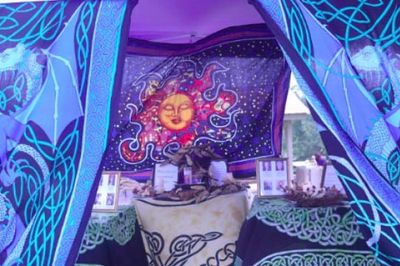I was brought up an Episcopalian. It was good training for my transition into a Wicca-friendly Jew. My first exposure to Wicca was at an Episcopal Church college—the practitioners were seminarians.
The news that my honorary pastor, the Reverend Alaina Kailyn Cobb, had fully come out of the pagan closet, therefore, did not surprise me...much.
This time last year, the chaplain of Mercy Junction Peace and Justice Centre in Chattanooga excitedly showed me a passage in the Tanakh (that's the Old Testament for most of you) where she had found a fairly clear reference of transgender people in a good light. Alaina and I both belong to that club, and the “Queerly Spiritual” one too.
I caught up with her just a few weeks after being invited to help her celebrate a late summer pagan holiday. Raised by a Church of God minister in a very strict conservative Christian environment, Alaina was a pastor in an evangelical church before her gender transition. When she transitioned, she blogged about her experience and faith journey. Her faith helped her to understand who she really was, and to accept herself as the woman that God made her.
People in similar circumstances who were having their own struggles began reaching out to her, then cisgender ministers began reaching out for advice on how to deal with LGBTQ+ people too. Alaina soon accepted the inevitable and began the search for a Christian denomination that not only affirmed queer people, but also celebrated it.
Her journey led to the Progressive Christian Alliance, a “fully queer-affirming and celebrating denomination” that was originally founded as such, per Alaina. She was apprenticed to another transgender woman in ministry and was ordained last year.
Alaina says that she discovered her pagan self through her Christianity. Raised in an Evangelical Protestant background, she had never had the opportunity to experience other expressions of Christian worship until leaving home. Her love for Roman Catholic liturgy and tradition led her to take a closer look at where much of it came from.
“I found much inspiration in learning about the Catholic saints and practices that had been adapted from pagan tradition,” Alaina said. “That’s one beautiful thing that I have learned as I worked my way through Christianity, especially how much Roman Catholicism and, by extension, Protestant Christian worship was borrowed from pagan roots. Finding my paganism was really just finding which parts of my Christian path I wanted to connect with...I am simply embracing the beauty I find from other religions and am using that to further enjoy and celebrate the God that I worship.”
“You have to remember...what we term ‘pagan’ a lot of times are things that just are not Christian,” she further explained. “‘Pagan’ has become a negative description. That doesn’t really work because you then group all these other traditions from other parts of the world together as bad when really they’re just different traditions...different understanding of G-d. We have something to learn from all of them.”
Before transition, her Evangelical Christian background had fully colored her opinions. The God she was taught to look up to was opposed to who she really was. Alaina’s plan before transition was to just find a way to avoid a fate in Christian hell upon her death, but a very personal spiritual experience at a Church retreat started her upon a new path.
“The great irony of my existence is that I began my journey of acceptance as a woman at a men’s retreat,” Alaina began as we both chuckled. It was a last-ditch effort upon her part to rid herself of her true nature, but things did not go according to plan.
“For two days, I did almost nothing but pray. On the third day, we had a worship service...and I had an experience where I saw a bright light upon all the people around me. The light stopped about a foot around me in a circle, and I wept. I cried out ‘Why? Why everyone but me?’ And then I heard a voice which said, ‘Who told you that?’ That was the change. That was what led me on the journey to accept myself and to love myself...in total acceptance and total surrender.
“When you start to believe yourself worthy of love...you find yourself lovable. And when you start to believe those around you are worthy of love, you then find them lovable too once you decide to treat them that way. My journey to acceptance was one of faith...accepting my call was a faith journey too...My journey to accepting G-d was one of deep revelation that I was loved - as I am, as I was named, as I was intended to experience a love of G-d.”
“Any advice for those in the community who may be curious or have friends who identify with Non-Christian traditions?” I asked
“Be not afraid,” was her reply.
“There is too much misunderstanding, and not enough curiosity. People think that faith requires a certainty, but faith dies in certainty. Faith is a fish that swims in the sea of doubt. The bigger the ocean, the bigger your faith can become.”
Blessed be.
